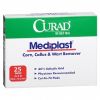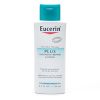Beauty Tips
Your Most Embarrassing Beauty Problems - DecodedToo mortified to talk to your friends or derm about your gross beauty issues? Here's the ugly truth on what's causing them -- and how to lose them for good |
Girls Don't Sweat. They Glisten What people think it is: When I think of avoiding pit stains, the image of Julia Roberts standing in front of an oscillating fan in a wedding dress in "Runaway Bride" comes to mind. I won't lie -- I've conducted my own swaying "keep cool" ritual in front of a fan before interviews and dates. Can you blame me? Since sweating is associated with nervousness, bad smells and a lack of confidence, having seriously sweaty pits in public is the animal kingdom equivalent of giving yourself up for slaughter.
What it actually is: Excessive sweating is known as hyperhidrosis in the medical world. Sweating is the body's method of regulating the body temperature. When your temperature rises, the hypothalamus tells the body to start sweating. In those who suffer from hyperhidrosis, the central nervous system doesn't shut this sweating off, for reasons unknown.
How you get it: No one knows why some people sweat excessively, but about four million women suffer from the drenching condition. Dr. Krant does warn that excessive sweating can be the sign of a problem:
"Excessive sweating can be, at best, extremely annoying and socially debilitating. At worst, it could be the sign of a tumor. If excessive sweating comes along with excessive redness, a fast heartbeat, gastrointestinal symptoms like diarrhea, or a feeling of anxiety, there could be more to the story."
Diabetes, thyroid problems, certain cancers and infection are just a few of the conditions that can trigger excessive sweating. If you've noticed a change in your normal sweating patterns, sweat profusely when you're not engaged in physical activity, or find that you're sweating all over your body, rather than the normal places like your armpits, head, face, groin, hands and feet, you should see a doctor.
How you get rid of it: Dr. Krant recommends first upgrading your antiperspirant to clinical strength and using a sweat gland-blocking product called Certain-Dri. If that doesn't work, you can ask your doctor for a prescription antiperspirant. If your body is still turning on the waterworks after these issues, you can get injections of Botox to stop localized sweat. Dr. Krant also recommends a new device called Mira Dry, a non-invasive procedure that uses microwave technology to zap (and destroy) the sweat glands in your armpits. In extreme cases, surgery is an option, though Dr. Krant says that this is used more and more rarely due to the risks (skin irritation, weakness of the hand muscles, or surgical complications) involved. She notes that most of these options are not covered by insurance.
How you prevent it: There's no way to stop sweating before it starts, other than the methods identified above. However, you can make it less smelly by avoiding spicy foods like garlic, onions, and curry. Being sweaty is one thing, but being sweaty and stinking like Tandoori Chicken is unbearable. To avoid the telltale dark circles on your clothing, there is such a thing as underarm pads that, yes, are pretty much like maxi-pads for your pits.
Related: The 10 Best Deodorants -- And the 4 Worst
SEE NEXT PAGE: If You Have Milia, You Are a Baby
What it actually is: Excessive sweating is known as hyperhidrosis in the medical world. Sweating is the body's method of regulating the body temperature. When your temperature rises, the hypothalamus tells the body to start sweating. In those who suffer from hyperhidrosis, the central nervous system doesn't shut this sweating off, for reasons unknown.
How you get it: No one knows why some people sweat excessively, but about four million women suffer from the drenching condition. Dr. Krant does warn that excessive sweating can be the sign of a problem:
"Excessive sweating can be, at best, extremely annoying and socially debilitating. At worst, it could be the sign of a tumor. If excessive sweating comes along with excessive redness, a fast heartbeat, gastrointestinal symptoms like diarrhea, or a feeling of anxiety, there could be more to the story."
Diabetes, thyroid problems, certain cancers and infection are just a few of the conditions that can trigger excessive sweating. If you've noticed a change in your normal sweating patterns, sweat profusely when you're not engaged in physical activity, or find that you're sweating all over your body, rather than the normal places like your armpits, head, face, groin, hands and feet, you should see a doctor.
How you get rid of it: Dr. Krant recommends first upgrading your antiperspirant to clinical strength and using a sweat gland-blocking product called Certain-Dri. If that doesn't work, you can ask your doctor for a prescription antiperspirant. If your body is still turning on the waterworks after these issues, you can get injections of Botox to stop localized sweat. Dr. Krant also recommends a new device called Mira Dry, a non-invasive procedure that uses microwave technology to zap (and destroy) the sweat glands in your armpits. In extreme cases, surgery is an option, though Dr. Krant says that this is used more and more rarely due to the risks (skin irritation, weakness of the hand muscles, or surgical complications) involved. She notes that most of these options are not covered by insurance.
How you prevent it: There's no way to stop sweating before it starts, other than the methods identified above. However, you can make it less smelly by avoiding spicy foods like garlic, onions, and curry. Being sweaty is one thing, but being sweaty and stinking like Tandoori Chicken is unbearable. To avoid the telltale dark circles on your clothing, there is such a thing as underarm pads that, yes, are pretty much like maxi-pads for your pits.
Related: The 10 Best Deodorants -- And the 4 Worst
SEE NEXT PAGE: If You Have Milia, You Are a Baby
































